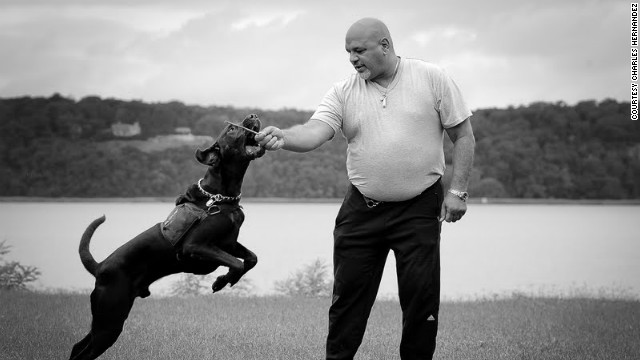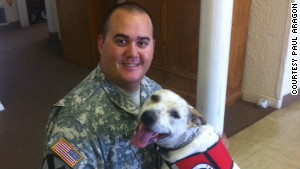Dogs: A medicine for mental health problems?
August 1, 2012 -- Updated 2056 GMT (0456
HKT)

Charles Hernandez, 49, credits his dog Valor for
helping him cope with PTSD.
STORY HIGHLIGHTS
- Psychiatric service dogs help people with mental disorders
- Emotional support animals comfort people with disabilities
- 'Not all wounds are visible,' says Sgt. Charles Hernandez
When Hernandez was having
seizures, Valor would nibble on the side of Hernandez's leg before the veteran
realized anything was wrong. And the dog pulls him away from conflicts and jumps
on him during anxiety attacks to calm him down. In combination with medications,
Hernandez says the dog has helped his symptoms of post-traumatic stress
disorder.
"I'm alive again," says
Hernandez, 49, of the Bronx, New York, now retired from the U.S. National Guard.
"What keeps me going is my dog."
A growing number of Americans are
getting dogs for mental health needs, experts say. In the case of psychiatric
service animals, such as Valor, they are trained specifically to help people
with mental illnesses, in much the way seeing-eye dogs are taught to help to
blind people.
PTSD in returning veterans is a
major reason for the increasing demand for these dogs, said John Ensminger, a
New York attorney and author of "Service and Therapy Dogs in American
Society."
Unlike guide dogs for people with
more obvious physical disabilities, there's a lot of gray area regarding who
gets to have a dog accompany them to places -- from restaurants to stores to
airplanes -- where animals are usually not allowed.
Why people get
psychiatric service dogs
There's pretty good evidence that
in some people, interacting with pets produces biochemical changes in the brain,
says Hal Herzog, professor of psychology at Western Carolina University.
"In a way, we could all use a
psychiatric service or therapy dog because of the incredible amount of stress
that we're all under," says psychiatrist Dr. Carole Lieberman, author of "Coping With Terrorism: Dreams
Interrupted."
Caring for a pet helps people
become less frightened, more self-sufficient and secure. It takes the attention
off their own fears, she said. Through owning a pet, you can "prove to yourself
that you can take care of another living creature," she said. It "reassures you
that you can take care of yourself."
Several categories of dogs that
provide care to people with mental health issues have arisen, as the
organization Heeling Allies describes:
The first is psychiatric service
dogs, which is where Valor falls. These are individually, intensely trained dogs
for people with mental disabilities. The Psychiatric Service Dog
Society has extensive information about these dogs and how to get a dog
trained. Heeling Allies calls them "mental health service dogs" because of the
stigma associated with the term "psychiatric."
Then there are emotional support
dogs, which provide comfort and motivation to people with disabilities. They may
be taken on planes and live in housing situations where animals are not usually
allowed, with proper documentation.
Finally, there are therapy dogs,
which help a large group of people. For instance, Ensminger's dog Chloe is a
therapy dog, and he voluntarily takes her to hospitals to comfort patients.
One of Lieberman's recent
patients, for whom the psychiatrist wrote a letter to help a dog get certified,
was a woman whose husband has a serious, progressive medical disorder, and she
felt stretched to the limit taking care of him.
Her standard poodle "provided
the emotional support when she was out of the house without her husband, that
her husband used to provide," Lieberman said.
Another patient, also female, is
undergoing stress because her home was put in foreclosure. She's also involved
in a lawsuit and a countersuit regarding the potential loss of her
multimillion-dollar property, Lieberman said.
The woman has to travel a lot
because her children live across the country, and her mental state is such that
sometimes she can't get out of bed. In this case, Lieberman compares the therapy
dog to a baby blanket: evoking feelings of warmth and being taken care of. "It
reminds her of when things were less traumatic," she said. "It's a tie to the
past."
Hernandez joined the National
Guard in 1996 and was one of the first responders at ground zero on September
11, 2001. He was deployed to Iraq from 2004 to 2006.
While in Iraq, Hernandez
suffered a spinal cord injury that limited his ability to walk and a traumatic
brain injury. Inside, he had changed, too. He became violent and agitated. And
he had nightmares, uncomfortable thoughts and dreams.
"Not all wounds are visible," he
said. "That's how I explain it to people."
Hernandez received a service dog
in 2010 through Project HEAL, part of ECAD, an
organization that trains and breeds assistance dogs. Project HEAL sets up
veterans with PTSD with service dogs. Hernandez still volunteers with Project
HEAL.
"He knows if something is wrong,
and I can't figure it out," Hernandez said of Valor. "The dog has the extra
Spider-Man sense." Hernandez still takes medication for PTSD.
Paul Aragon, a 29-year-old
retired veteran, also has PTSD, but his only treatment is his service dog.
Aragon got his service dog, Zoey, in October after his medication stopped
working. Zoey "keeps me calm," he says.

Paul Aragon says his dog, Zoey, calms him down. Aragon experiences symptoms
of PTSD.
Aragon, who studies motorcycle
mechanics at Universal Technical Institute in Orlando, takes Zoey everywhere:
dinner, movies, plane trips, even sometimes to school.
But not everyone recognizes the
dogs as legitimate. Hernandez and Aragon have had incidents where people have
questioned their bringing a dog into a public place. Hernandez even filed a
lawsuit last year, alleging that he was kicked out of a fast-food restaurant
because of his dog. It was later settled out of court.
The legal
side
Part of the reason that
psychiatric service dogs present a tricky situation is that different federal
agencies implement different regulations with respect to them.
The Department of Justice, in
its guidelines for implementing the Americans with Disabilities
Act, defines "service animals" as "dogs that are individually trained to do
work or perform tasks for people with disabilities." This can include "alerting
and protecting a person who is having a seizure, reminding a person with mental
illness to take prescribed medications, calming a person with Post Traumatic
Stress Disorder (PTSD) during an anxiety attack, or performing other
duties."
The guidelines state that dogs
whose "sole function is to provide comfort or emotional support do not qualify
as service animals under the ADA."
But service animals are required
to be allowed in establishments that sell or prepare food, for example. And
"allergies and fear of dogs are not valid reasons for denying access or refusing
service to people using service animals," according to the guidelines.
In a situation such as a school
classroom or a homeless shelter, the allergic person and the person with the
service dog should be assigned to different locations if possible, the
guidelines say.
The Department of
Transportation, on the other hand, makes reference to animals that "assist
persons with disabilities by providing emotional support." Its
guidelines allow airlines to require documentation of a person's disability
and say that the medical necessity of having the animal while traveling is
understood.
The Department of Housing and
Urban Development talks about assistance animals, which can include "providing emotional
support to persons who have a disability related need for such support."
There's room for fraud and shady
maneuvering here, Ensminger said. There have been cases where patients have
written their own letters that psychiatrists have signed to recommend certifying
a psychiatric dog. That's not how prescribing a treatment is supposed to work.
There are also fake certification websites, Herzog said.
And it's not just a letter that
turns a dog into a psychiatric service dog. There's a rigorous training
procedure, and the whole process can cost as much as $38,000, Ensminger
estimates.
Although some people try to
train dogs themselves, this approach often fails because it takes a lot of
expertise to choose the right dog, train it, and develop a relationship between
a person and a service dog, said Darcie Boltz, executive director of Heeling
Allies.
It takes a dog with a unique
temperament to be properly suited for this work, and there can be animal welfare
issues when improperly selected or trained dogs become mental health service
dogs, Boltz said.
Although the system for
psychiatric service dogs and emotional support animals can be abused, Lieberman
says it's rare.
"If it isn't really important to
you psychologically, there's so much hassle that you have to go through, you
wouldn't necessarily ask for it," she said. "The solace of having your dog there
to comfort you needs to be more important than the hassle you have to go
through."
Lieberman recommends to her
patients that dogs for mental health needs have some sort of identifying jacket
so that there's less stigma and confusion around taking it to a place where
animals usually aren't permitted.
The flip
side
A bill passed by the Senate this
month may restrict service dog access in the Veterans Affairs Department for
people whose dogs did not come from accredited trainers, the Army Times reported.
Mental health support dogs also
might lead to situations where people with the animals are on the same plane
flight as people with severe pet allergies.
This is a problem for Sloane
Miller, allergy advocate and life coach with severe asthma. She recalls that
three years ago, she couldn't board her scheduled plane, or any other with the
same airline to Florida that day, because emotional support animals were flying,
too.
Miller supports service animals,
but "it should be fair for everyone who has a need and a disability," she said.
"There needs to be some kind of protection for my rights as well, to be able to
travel in a safe environment."
And don't forget the animal's
well-being, says Lori Marino, senior lecturer in psychology at Emory University.
While it's a healthy path for some, there is concern that the animals themselves
may be emotionally harmed. When dogs are paired with depressed and anxious
people, the animals might become depressed and anxious, too.
Marino has worked with a
homeless pet rescue, evaluating whether prospective pet owners are good matches
for prospective dogs. Once in a while, a prospective owner will say, "I want
this dog because I am depressed and need a pick-me-up," Marino said.
"I always decline that person.
It's not fair to the dog to go to a home that's not emotionally healthy," she
said. A dog "shouldn't be used as medicine."
But for people such as Hernandez
and Aragon, dogs are medicine, a medicine that is keeping their PTSD in check.
Hernandez has become a strong advocate for service dogs.
"The dog has taught me how to be
humble, how to have stability, have to have patience," says Hernandez.

No comments:
Post a Comment